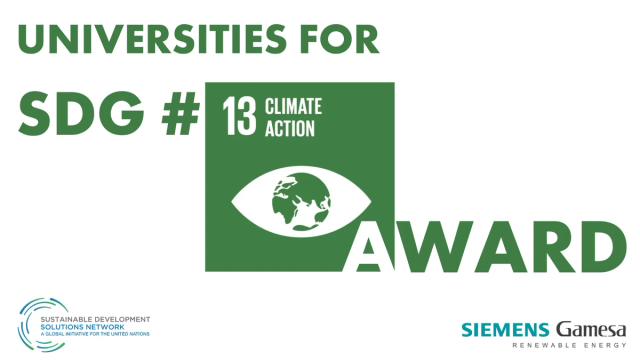SDSN and Siemens Gamesa Seal an Alliance to Promote STEM Talent in the Fight Against Climate Change
Key Takeaways
- Siemens Gamesa and the United Nations Sustainable Development Solutions Network (SDSN) have sealed an alliance to promote university talent in the fight against climate change (SDG 13) while enhancing the relevant role of innovation for quality education (SDG 4)
- “Universities for SDG 13” is an international competition where students from selected universities work across disciplines to produce disruptive solutions for energy transition and environmental sustainability
- For this first edition, five universities have been selected from SDSN’s network: Tsinghua University in China, the University of Pretoria in South Africa, the University of Göttingen in Germany, the Pontifical University of Rio de Janeiro in Brazil, and Arizona State University in the United States of America
Addressing the climate emergency by changing the trajectory of CO2 levels is the most pressing imperative of our time and it requires urgent measures. Students are particularly aware of this urgency, and universities have a unique and critical role in meeting this need.
This is why the United Nations Sustainable Development Solutions Network (SDSN), together with Siemens Gamesa, through its Social Commitment department, are tapping into the great role students can play for disruptive solutions.
Through their new alliance, Siemens Gamesa and SDSN are setting out to promote university talent in the fight against climate change (SDG 13) through a team competition to produce the best disruptive solutions to speed up action for the achievement of the Sustainable Development Goals (SDGs). The winning solution will be awarded 10,000 EUR in prize money for further development and implementation.
Siemens Gamesa and SDSN want to give them a chance to be part of the solution while promoting innovation for quality education (SDG 4) in Science, Technology, Engineering and Mathematics (STEM).
The selected universities will work with undergraduate and graduate students across disciplines to produce solutions for the energy transition and environmental sustainability while supporting regional development.
Solutions should have disruptive potential, be aligned with the SDGs and be technically feasible.
The first edition of Universities for SDG13 will start in January and end in September 2022 during an award ceremony which will take place in New York on the sidelines of the U.N. General Assembly.
Throughout the competition, students will be assisted by teaching staff and mentors from Siemens Gamesa and SDSN. Projects will require a multidisciplinary approach which is essential for the transformation, considering technological, legal, economic, and social aspects of the transition toward a carbon free economy.
By giving students the opportunity to demonstrate their talent and skills in a collaborative and competitive way, universities will position themselves and their faculties within a dynamic and innovative environment, while providing regional stakeholders with an understanding of technical, legal, and sociological aspects of how local economies could decarbonize.
For this first edition, five universities have been chosen from SDSN’s network: Tsinghua University in China, the University of Pretoria of South Africa, the University of Göttingen of Germany, Pontifical University of Rio de Janeiro in Brazil, and Arizona State University in the United States of America .
As leaders in their fields, Siemens Gamesa and SDSN share the belief that the current lack of interest in STEM careers among young people, especially women, could jeopardize society’s efforts to advance toward sustainability.
Through its Social Commitment department, Siemens Gamesa is devoted to advancing Agenda 2030 with initiatives aligned with five of its Sustainable Development Goals: SDG 1 (No poverty); SDG 4 (Quality Education); SDG 13 (Climate Action); SDG 14 (Life Below Water); and SDG 15 (Life on land).
“We are concerned about the lack of vocations in STEM. By showing the role of innovation and in STEM in solving today’s challenges, we want to expose students to the benefit of a technical career to build a better world," said María Cortina, global head of Social Commitment at Siemens Gamesa.
“Our goal is to maximize the visibility of students as an innovative driving force toward the achievement of the SDGs, in particular an issue that is so relevant to all of them such as climate change, " added Ms. Cortina.
María Cortés Puch, Vice President of Networks at SDSN, adds: “Universities and their students are uniquely placed to help achieve the Sustainable Development Goals. We are excited for the creative solutions the students can come up with! We will do our best to support them bringing these to fruition”.
----------------------------------------------------
About Siemens Gamesa Renewable Energy
Siemens Gamesa unlocks the power of wind. For more than 40 years, we have been a pioneer and leader of the wind industry, and today our team of more than 25,000 colleagues work at the center of the global energy revolution to tackle the most significant challenge of our generation – the climate crisis. With a leading position in onshore, offshore, and service, we engineer, build and deliver powerful and reliable wind energy solutions in strong partnership with our customers. A global business with local impact, we have installed more than 110 GW and provide access to clean, affordable and sustainable energy that keeps the lights on across the world. To find out more, visit www.siemensgamesa.com and connect with us on social media.
About the UN Sustainable Development Solutions Network (SDSN):
SDSN mobilizes global scientific and technological expertise to create practical solutions for sustainable development, including the implementation of the Sustainable Development Goals (SDGs) and the Paris Climate Agreement. The SDSN has been operating since 2012 under the auspices of the UN Secretary-General. The SDSN is building national and regional networks of knowledge institutions, solution-focused thematic networks, and the SDG Academy, its flagship online education initiative.
